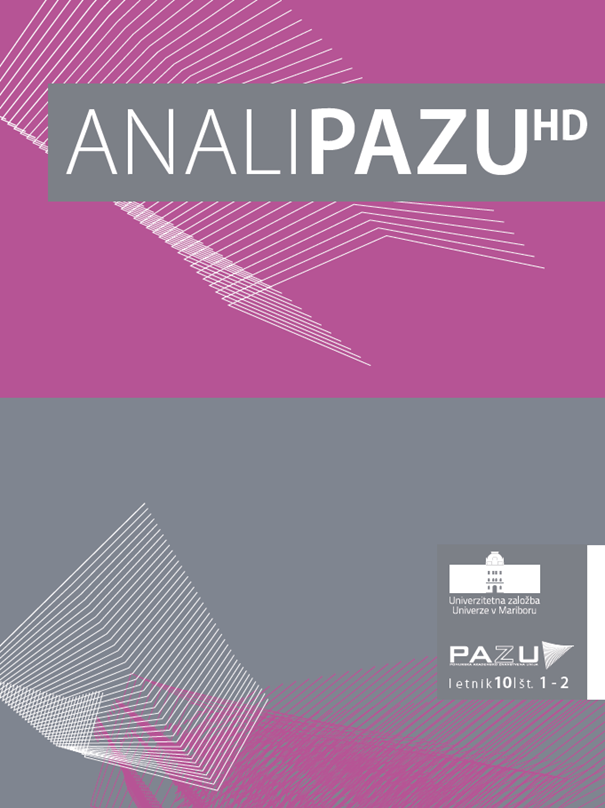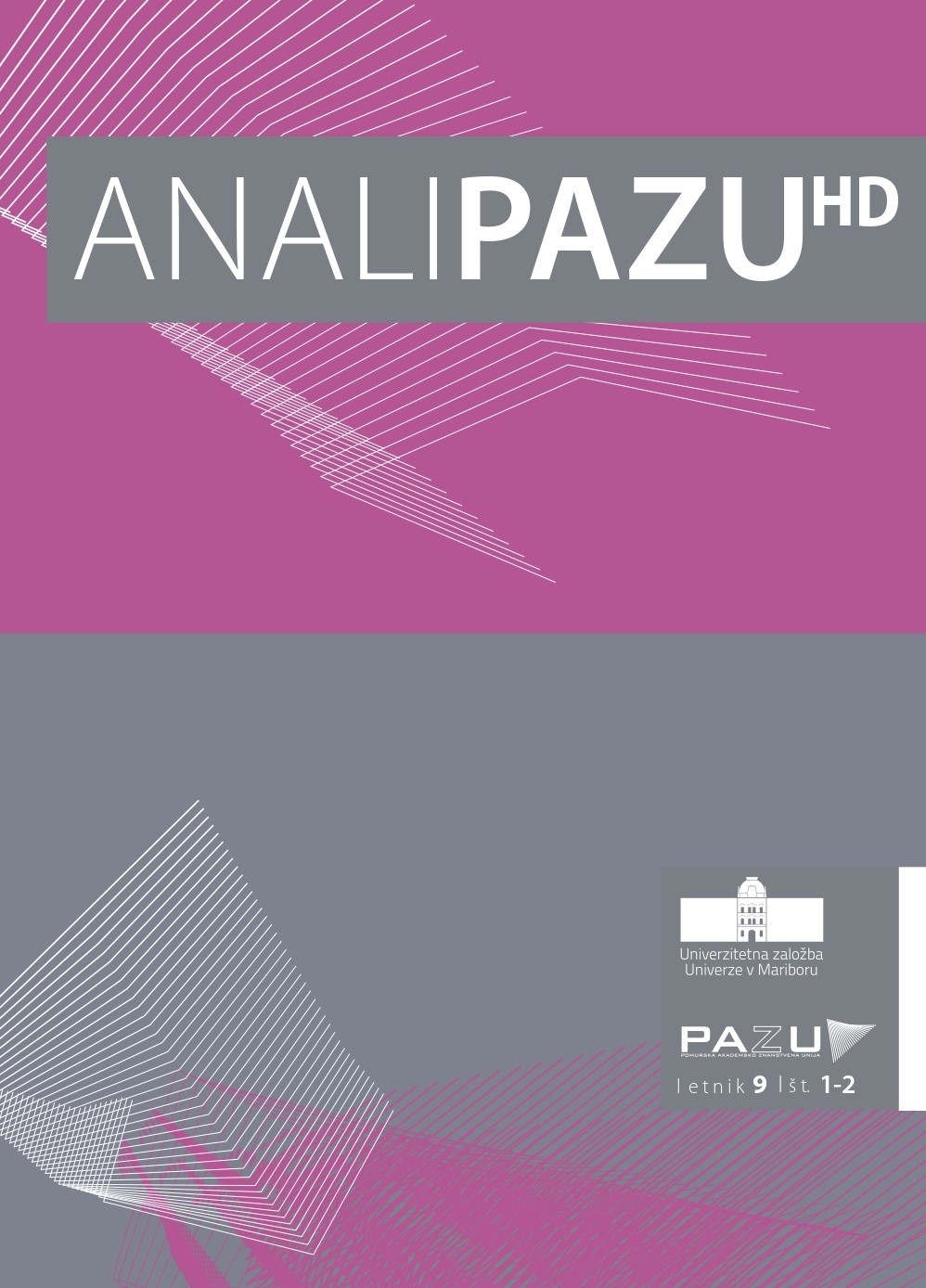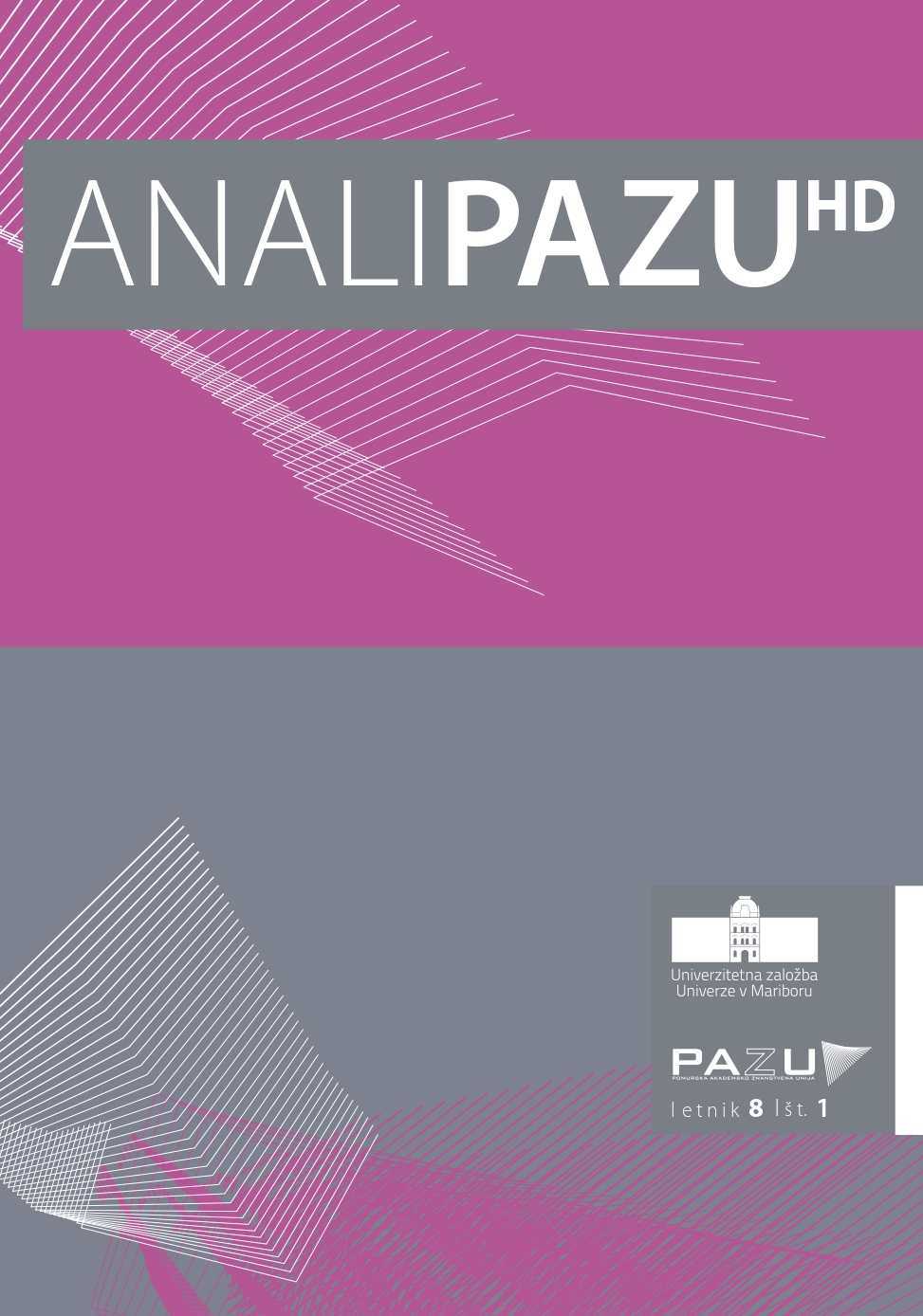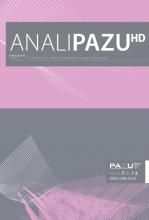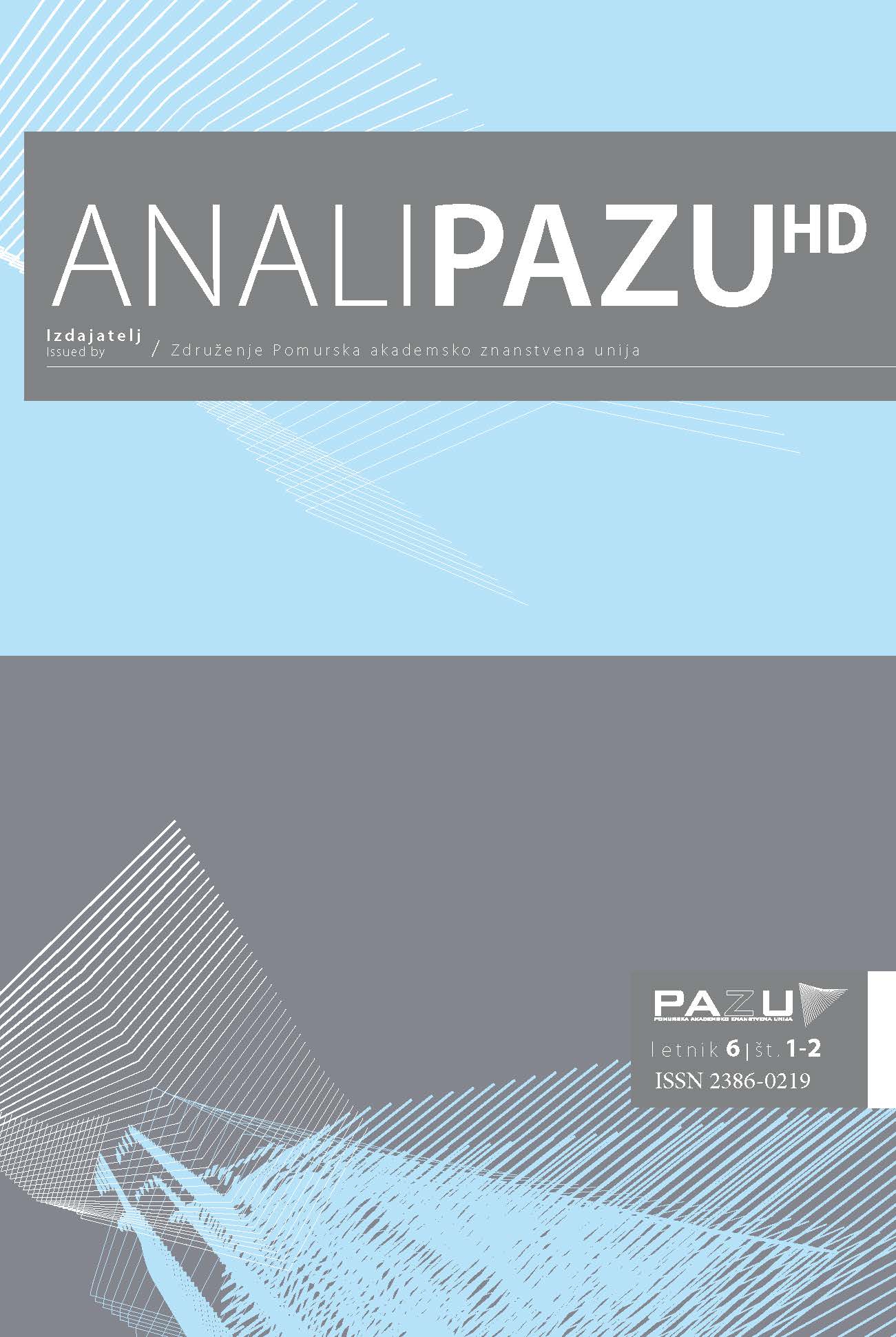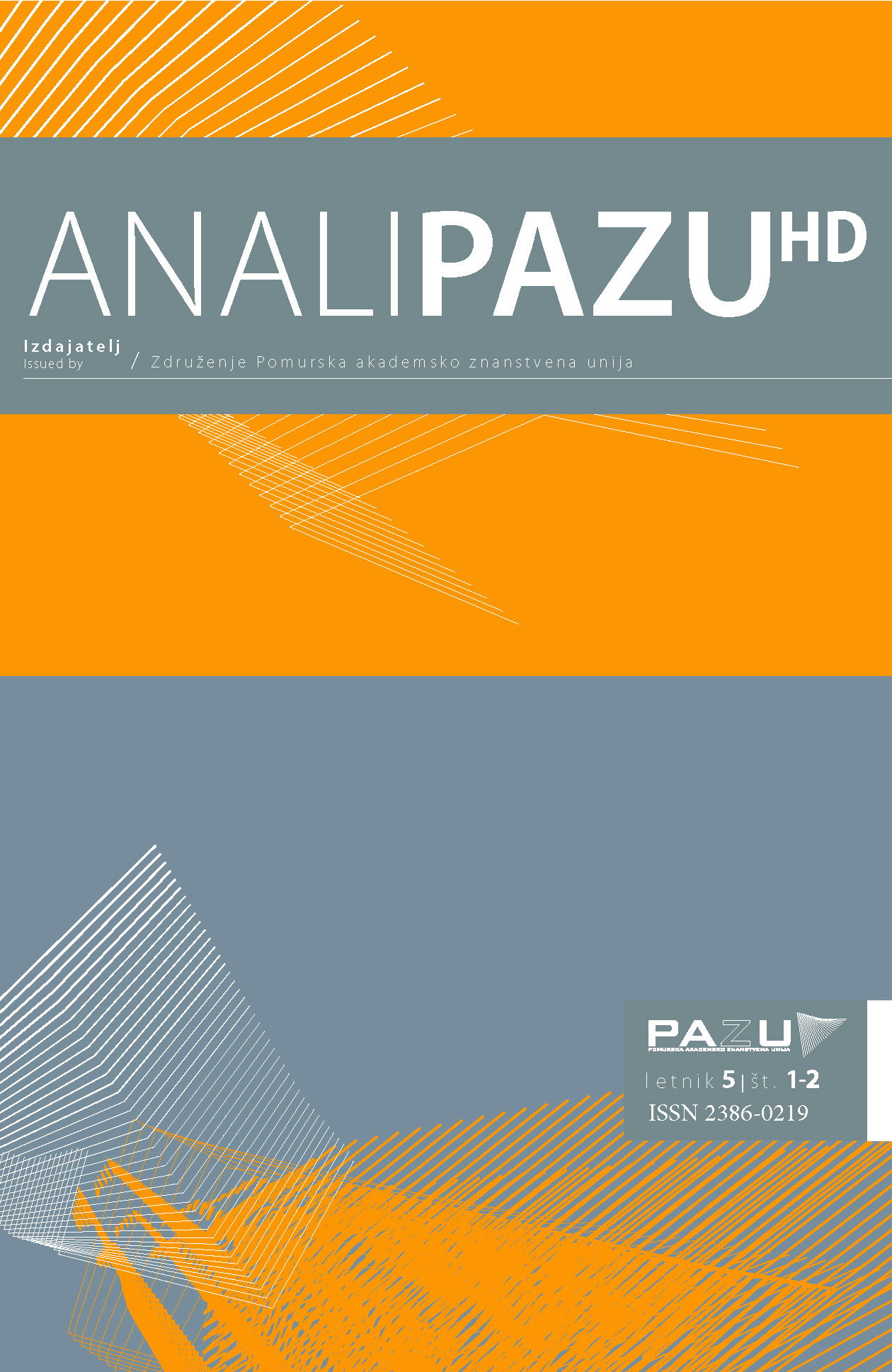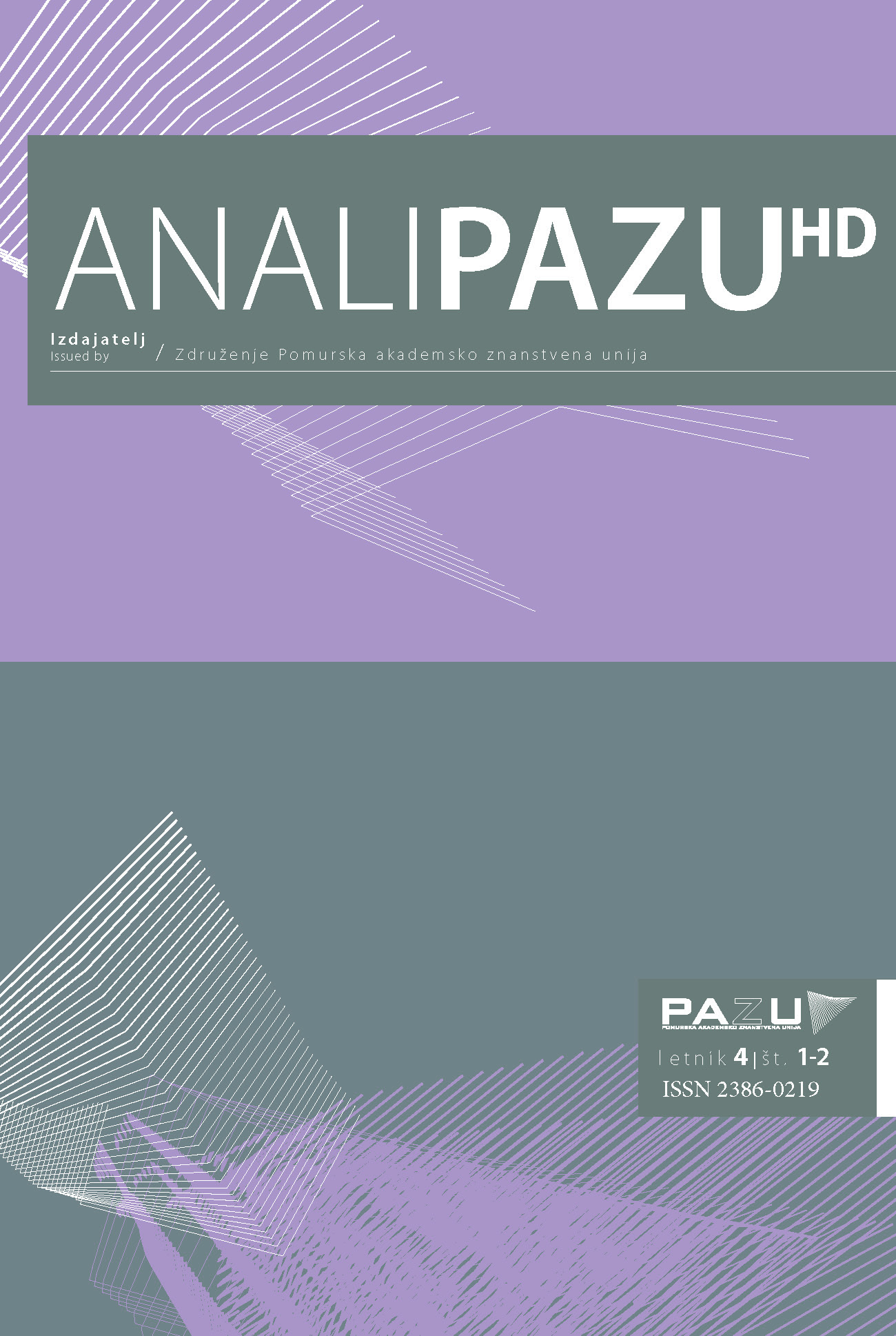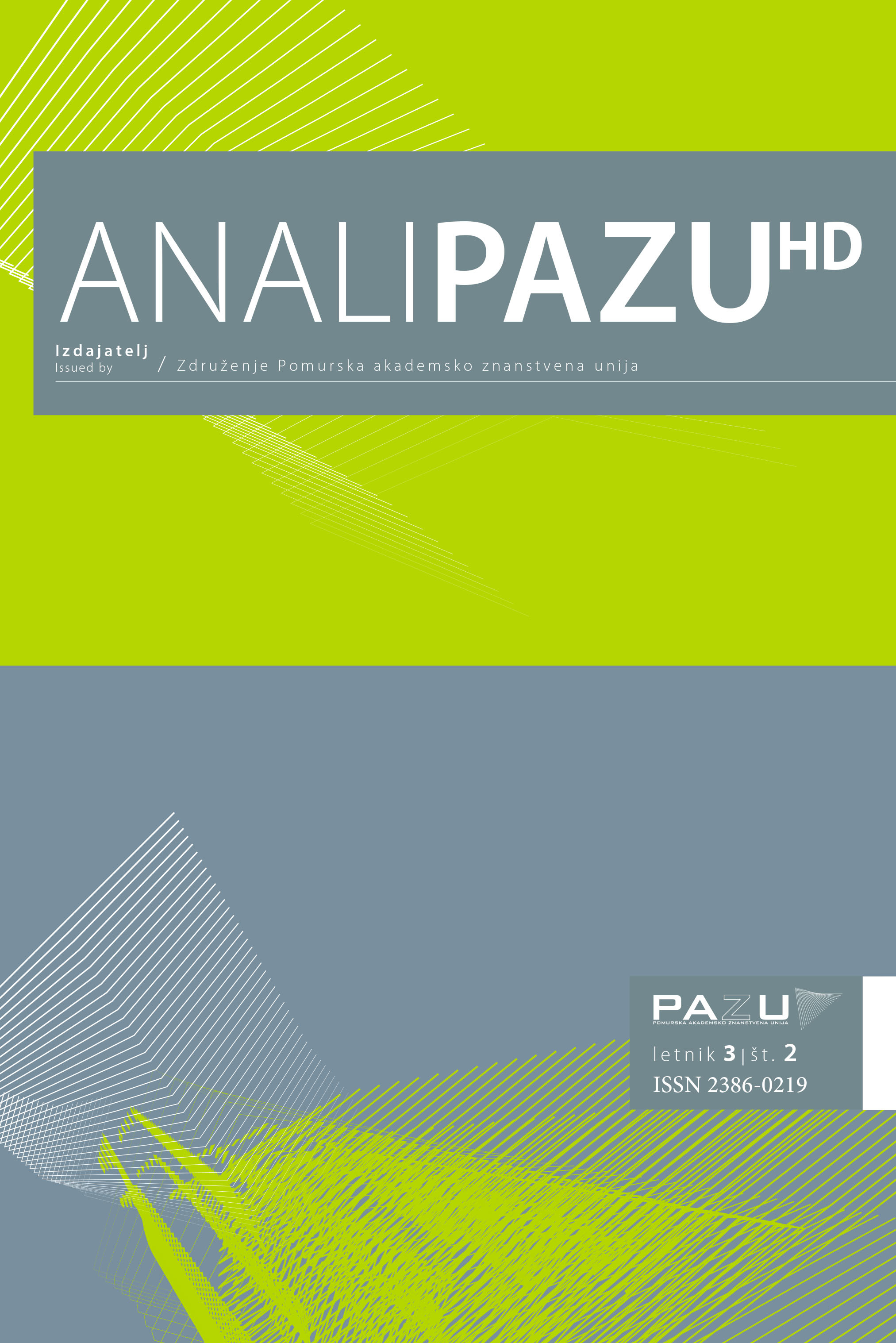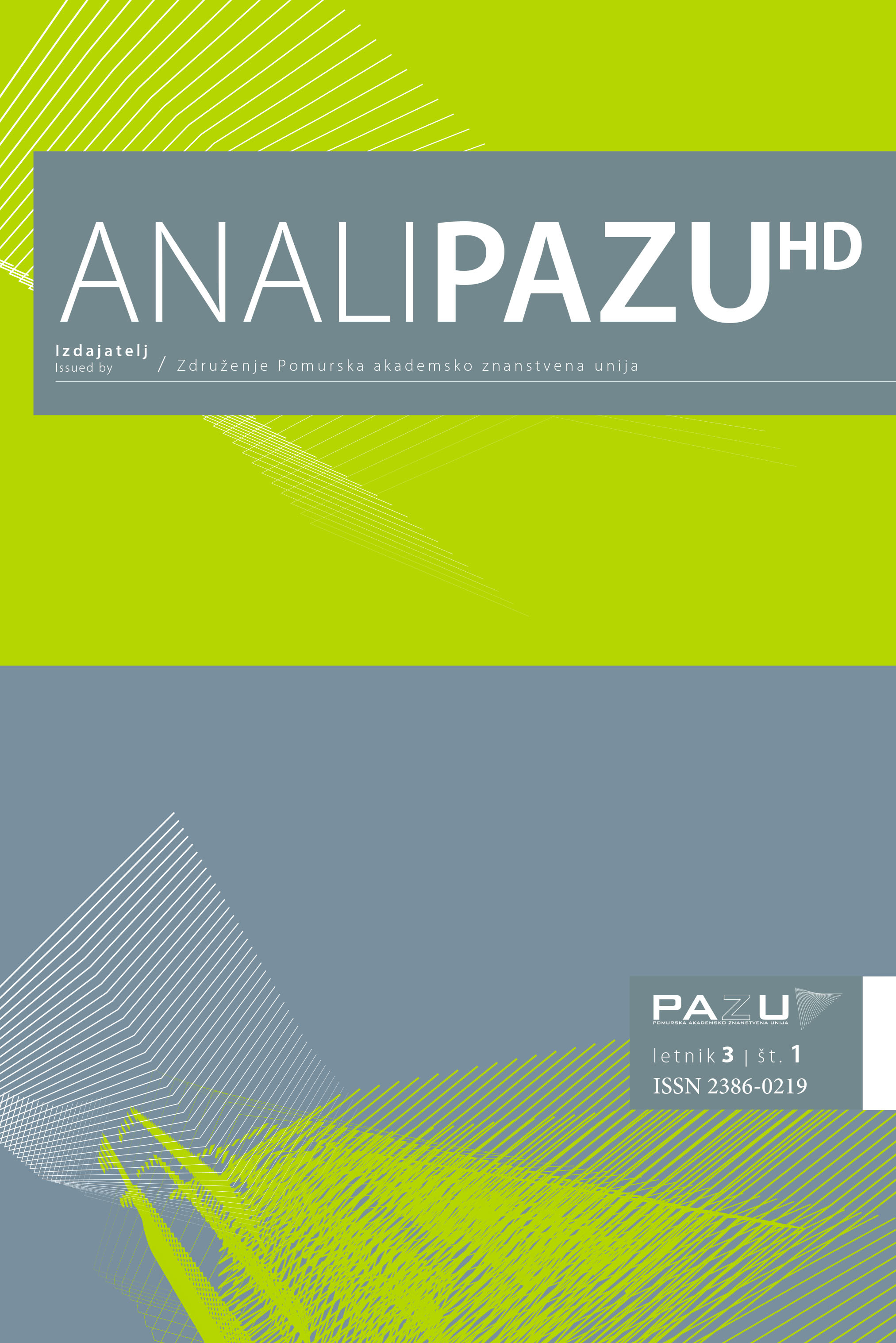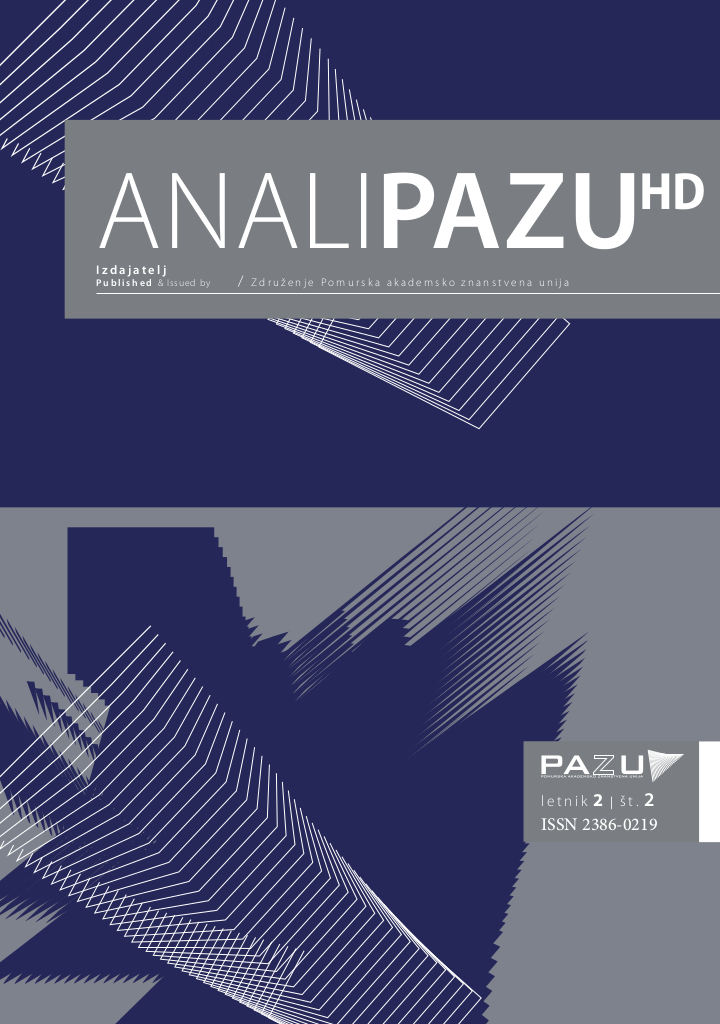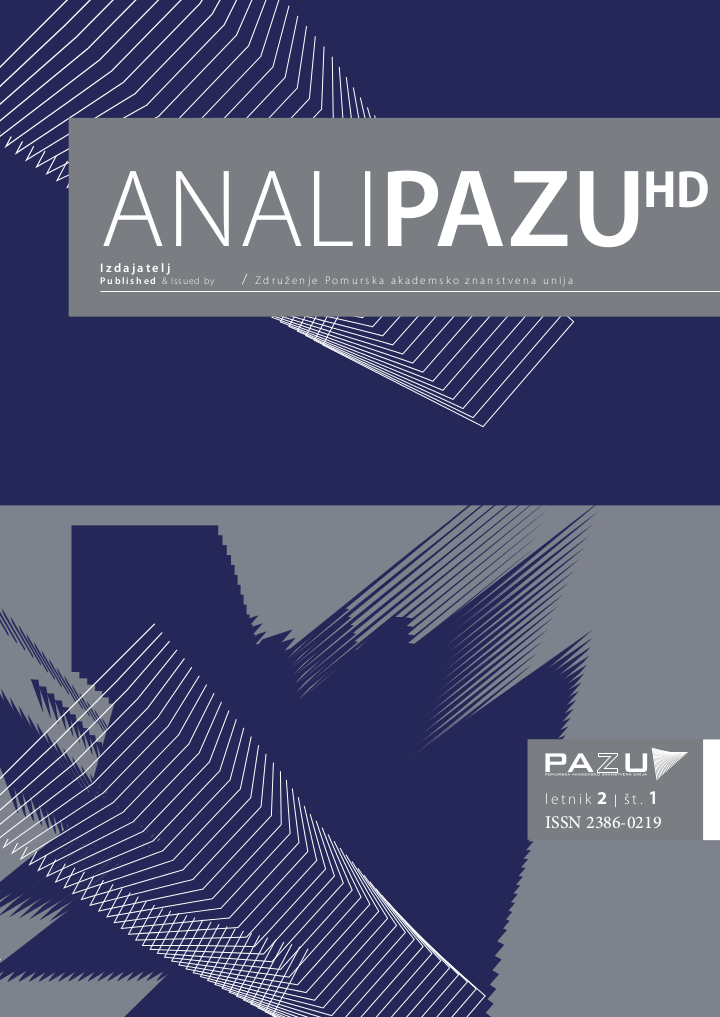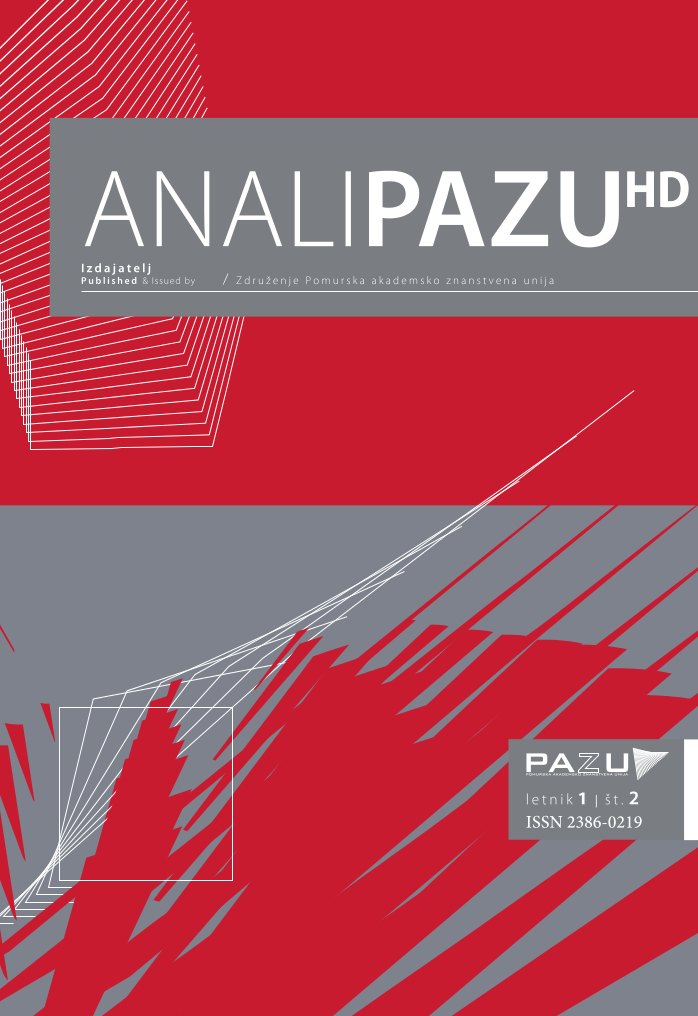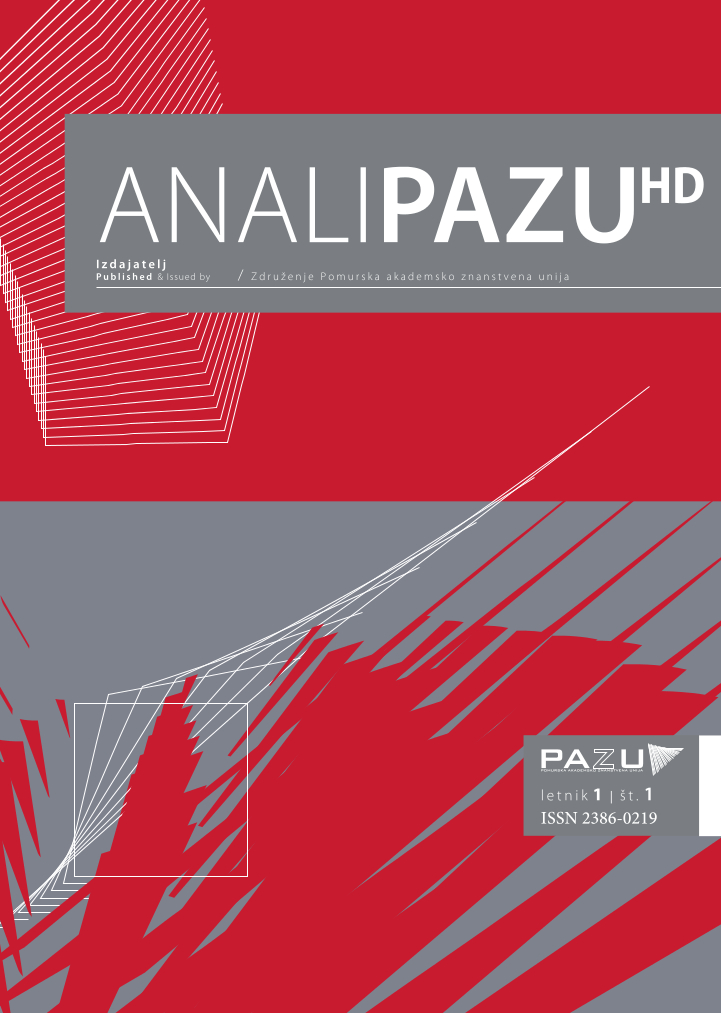-
ANALI PAZU HDVol 10 No 1-2 (2024)
EDITORIAL
Dr. Darja Senčur PečekYou are holding a new issue of ANALI PAZU HD, which features four scientific articles spanning various academic fields.
The first article examines community policing as one of the newer approaches to ensuring public safety. It presents the findings of a study conducted in the jurisdiction of the Murska Sobota Police Directorate. Based on interviews with community policing leaders in rural and urban areas of the Pomurje region, the study confirmed several prior conclusions, including some from the authors’ earlier research, which this study builds upon. The research identifies the strengths and weaknesses of community policing leadership in both rural and urban environments. It proposes several concrete measures, such as additional training for community police leaders in communication and interpersonal skills, sharing best practices among community police leaders, and implementing strategies to foster closer ties with residents. These measures aim to enhance community policing and, consequently, public safety in Pomurje.
The second article addresses the personalization of digital applications for pregnant women. The author begins by highlighting that pregnancy apps are the most popular type of health-related digital applications, with personalization being a key selling feature. After reviewing 1,121 articles from key databases mentioned in the paper, six studies were included in the analysis. The author describes all essential dimensions of personalization as defined in the literature. She emphasizes that personalization in pregnancy apps is largely dependent on the app's intended purpose. The study concludes that no existing pregnancy app includes all described aspects of personalization. The author calls for future research to focus on adapting apps to better serve women from underrepresented geographic, social, and cultural backgrounds.
The third article explores trends and strategies in licensing within the pharmaceutical industry. The ability to innovate is critical for the future of pharmaceutical companies. Innovations now arise not only within in-house research and development units but also through collaboration with other stakeholders in the pharmaceutical sector. Licensing, which involves transferring technology from the innovator to the licensee for a fee, plays a significant role in this process. The article discusses various forms of licensing, including in-licensing, out-licensing, and university technology licensing. The authors reviewed literature on each form, examining their causes, influencing factors, advantages, and disadvantages. Alternatives to licensing, such as mergers and acquisitions, are also addressed. The study concludes that open business models and various forms of collaboration accelerate the development of new drugs.
The fourth article deals with consumer understanding of fruit production systems. The authors present the results of a study involving consumers from diverse demographic backgrounds. The study focused on their knowledge of fruit production systems and their shopping habits. The findings reveal that Slovene consumers primarily purchase staple foods from retail stores, with only 30% buying fruit directly from local producers or markets. Additionally, consumers display a limited understanding of both certified and non-certified fruit production systems in Slovenia, despite many believing otherwise. Given that understanding sustainable supply systems is essential for informed and safe fruit consumption, the authors conclude that the findings are concerning and highlight the need for more effective consumer education and awareness initiatives.
We warmly invite you to read this issue!
-
ANALI PAZU HDVol 9 No 1-2 (2023)
EDITORIAL
This issue of the journal ANALI PAZU HD contains five scientific articles in the fields of humanities and social sciences.
The first three articles address various aspects of communication. They touch on the topic of the Prekmurje dialect, the emergence of new vocabulary in Slovenian, German, and Hungarian due to the coronavirus, and the importance of proper public speaking for effective communication.
In the first article, related to the text from the Prekmurski pisker project, the theoretical level is illustrated with the use of the words pisker (pot) and lonec (pot) to explain why the author believes the question of whether we can speak of the Prekmurje dialect today is redundant.
The second article presents the conceptualization of the COVID-19 pandemic and the lexical changes in Slovenian, German, and Hungarian languages triggered by the global extralinguistic factor - the SARS-CoV-2 virus.
The author of the third article conducted a theoretical analysis of public speaking in Slovenian, with an emphasis on the use of proper pronunciation and the importance of preparation for public speaking. The author finds that quality preparation for a public appearance reduces both substantive and non-verbal errors, contributing to higher quality communication.
The last two articles fall within the realm of social sciences.
The penultimate article concerns the handling of deserters and captured members of the federal forces during the independence war of 1991 in the Pomurje region. Based on a description of the premises for recall and the call for members of the Yugoslav People's Army (JLA) to join the Slovenian defense forces, an examination of the characteristics of functional demarcation regarding collection centers between the Territorial Defense (TO) and Civil Protection (ONZ), and an analysis of numerical indicators, the author presents some new findings.
The final article analyzes various strategies (such as sensible portfolio management, mergers and acquisitions, the "open innovation" model, innovation hubs, and internal start-up incubators) used by large pharmaceutical companies to address the problem of innovation in research and development.
Each of the published articles brings new professional insights, interesting for anyone interested in the discussed fields.
Happy reading!
Dr. Darja Senčur Peček, Editor-in-Chief
Editor-in-Chief: Darja Senčur Peček (University of Maribor, Faculty of Law, Slovenia)
Editors for Social Sciences: Simona Šarotar Žižek (University of Maribor, Faculty of Economics and Business, Slovenia); Petra Cajnko (University of Maribor, Faculty of Natural Sciences and Mathematics, Slovenia)
Editors for Humanities: Jana S. Rošker (University of Ljubljana, Faculty of Arts, Slovenia); Vesna Koncrič Horvat (University of Maribor, Faculty of Arts, Slovenia); Damir Josipovič (Institute for Ethnic Studies, Slovenia); Darja Kerec (University of Ljubljana, Faculty of Education, Slovenia)
Technical Editor: Petra Cajnko (University of Maribor, Faculty of Natural Sciences and Mathematics, Slovenia)
-
Anali Pazu HDVol 8 No 1 (2022)
Editorial
The first issue of ANALI PAZU HD this year brings four interesting articles that cover various fields of social sciences and humanities. The first article deals with the psychological consequences of coping with chronic pain in adolescents. The authors of the paper conducted a pilot study (among ten adolescent girls with an average age of 14.9 years). The results of this study (based on the responsible groups of adolescents and the assessment of their parents) were compared with normative data. The authors note that all adolescents included in the study cope with the consequences of chronic illness, especially anxiety and depression. He emphasizes that the assessment of psychological consequences and their precise key are key to further planning psychological treatments and therapies. The second paper presents a new teaching method, counseling mentoring. The paper covers the theoretical treatment of this method and the empirical research. The author presents the results of the introduction of this method (two tools) in process education (in the study subjects Mathematical Modeling and Business Economics and Management in the period 2019/2020 and 2020/2021). The results of the research show that the lecturer and the student, with the help of counseling mentoring, make progress in achieving the set goal. The author thus recommends the introduction of this method in the educational process. The third article deals with the current topic of the Covid-19 pandemic, given the geopolitical changes as a consequence of the pandemic. As the key economic issue of the COVID-19 pandemic, the author raises the question of whether this is just a severe recession or a wave of economic depression. The article analyzes the geopolitical situation in the world. The author states that there is a high expectation that the country, based on the experience of the first year of the epidemic in 2021, will be able to vaccinate the population, normalize public life and start the economy at full speed. This would prevent a deep recession from escalating into a depression without changing the geopolitical world order. The author noted that it did not happen as expected and solutions will have to be expected in the coming years. The last article deals with the genesis and operational characteristics of the war of independence in Prekmurje and Prlekija 30 years ago. The author notes that the case of the province along the Mura clearly shows the characteristics of the operational activities of the Yugoslav People's Army and the peculiarities of the activities of the Slovenian Defense Forces. From these characteristics, the author then draws conclusions about the genesis and operational characteristics of the war in the Republic of Slovenia and about the intentions to forcibly prevent Slovenian independence. You are invited to read!
Darja Senčur Peček, Editor-in-Chief
Editor-in-Chief: Darja Senčur Peček (University of Maribor, Faculty of Law, Slovenia)
Co-editor for Social Science: Metka Kuhar (University of Ljubljana, Faculty of Social Sciences, Slovenia)
Co-editor for Humanities: Jana S. Rošker (University of Ljubljana, Faculty of Philosophy, Slovenia); Vesna Koncrič Horvat (University of Maribor, Faculty of Arts, Slovenia); Damir Josipovič (Institute for National Issues, Slovenia); Darja Kerec (University of Ljubljana, Faculty of Arts, Slovenia)
Technical editor: Petra Cajnko (University of Maribor, Faculty of Science and Mathematics, Slovenia)
-
ANALI PAZU HDVol 7 No 1-2 (2021)
Editor-in-Chief: Darja Senčur Peček (University of Maribor, Faculty of Law, Slovenia)
Co-editor for Social Science: Metka Kuhar (University of Ljubljana, Faculty of Social Sciences, Slovenia)
Co-editor for Humanities: Jana S. Rošker (University of Ljubljana, Faculty of Philosophy, Slovenia); Vesna Koncrič Horvat (University of Maribor, Faculty of Arts, Slovenia); Damir Josipovič (Institute for National Issues, Slovenia); Darja Kerec (University of Ljubljana, Faculty of Arts, Slovenia)
Technical editor: Petra Cajnko (University of Maribor, Faculty of Science and Mathematics, Slovenia)
-
ANALI PAZU HDVol 6 No 1-2 (2020)
Editor-in-Chief: Darja Senčur Peček (University of Maribor, Faculty of Law, Slovenia)
Co-editor for Social Science: Metka Kuhar (University of Ljubljana, Faculty of Social Sciences, Slovenia)
Co-editor for Humanities: Jana S. Rošker (University of Ljubljana, Faculty of Philosophy, Slovenia); Vesna Koncrič Horvat (University of Maribor, Faculty of Arts, Slovenia); Damir Josipovič (Institute for National Issues, Slovenia); Darja Kerec (University of Ljubljana, Faculty of Arts, Slovenia)
Technical editor: Petra Cajnko (University of Maribor, Faculty of Science and Mathematics, Slovenia)
-
ANALI PAZU HDVol 5 No 1-2 (2019)
Editor-in-Chief: Darja Senčur Peček (University of Maribor, Faculty of Law, Slovenia)
Co-editor for Social Science: Metka Kuhar (University of Ljubljana, Faculty of Social Sciences, Slovenia)
Co-editor for Humanities: Jana S. Rošker (University of Ljubljana, Faculty of Philosophy, Slovenia); Vesna Koncrič Horvat (University of Maribor, Faculty of Arts, Slovenia); Damir Josipovič (Institute for National Issues, Slovenia); Darja Kerec (University of Ljubljana, Faculty of Arts, Slovenia)
Technical editor: Petra Cajnko (University of Maribor, Faculty of Science and Mathematics, Slovenia)
-
ANALI PAZU HDVol 4 No 1-2 (2018)
Editor-in-Chief: Darja Senčur Peček (University of Maribor, Faculty of Law, Slovenia)
Co-editor for Social Science: Metka Kuhar (University of Ljubljana, Faculty of Social Sciences, Slovenia)
Co-editor for Humanities: Jana S. Rošker (University of Ljubljana, Faculty of Philosophy, Slovenia); Vesna Koncrič Horvat (University of Maribor, Faculty of Arts, Slovenia); Damir Josipovič (Institute for National Issues, Slovenia); Darja Kerec (University of Ljubljana, Faculty of Arts, Slovenia)
Technical editor: Petra Cajnko (University of Maribor, Faculty of Science and Mathematics, Slovenia)
-
ANALI PAZU HDVol 3 No 2 (2017)
Editor-in-Chief: Darja Senčur Peček (University of Maribor, Faculty of Law, Slovenia)
Co-editor for Social Science: Metka Kuhar (University of Ljubljana, Faculty of Social Sciences, Slovenia)
Co-editor for Humanities: Jana S. Rošker (University of Ljubljana, Faculty of Philosophy, Slovenia); Vesna Koncrič Horvat (University of Maribor, Faculty of Arts, Slovenia); Damir Josipovič (Institute for National Issues, Slovenia); Darja Kerec (University of Ljubljana, Faculty of Arts, Slovenia)
Technical editor: Petra Cajnko (University of Maribor, Faculty of Science and Mathematics, Slovenia)
-
ANALI PAZU HDVol 3 No 1 (2017)
Editor-in-Chief: Darja Senčur Peček (University of Maribor, Faculty of Law, Slovenia)
Co-editor for Social Science: Metka Kuhar (University of Ljubljana, Faculty of Social Sciences, Slovenia)
Co-editor for Humanities: Jana S. Rošker (University of Ljubljana, Faculty of Philosophy, Slovenia); Vesna Koncrič Horvat (University of Maribor, Faculty of Arts, Slovenia); Damir Josipovič (Institute for National Issues, Slovenia); Darja Kerec (University of Ljubljana, Faculty of Arts, Slovenia)
Technical editor: Petra Cajnko (University of Maribor, Faculty of Science and Mathematics, Slovenia)
-
ANALI PAZU HDVol 2 No 2 (2016)
Editor-in-Chief: Darja Senčur Peček (University of Maribor, Faculty of Law, Slovenia)
Co-editor for Social Science: Metka Kuhar (University of Ljubljana, Faculty of Social Sciences, Slovenia)
Co-editor for Humanities: Jana S. Rošker (University of Ljubljana, Faculty of Philosophy, Slovenia); Vesna Koncrič Horvat (University of Maribor, Faculty of Arts, Slovenia); Damir Josipovič (Institute for National Issues, Slovenia); Darja Kerec (University of Ljubljana, Faculty of Arts, Slovenia)
Technical editor: Petra Cajnko (University of Maribor, Faculty of Science and Mathematics, Slovenia)
-
ANALI PAZU HDVol 2 No 1 (2016)
Editor-in-Chief: Darja Senčur Peček (University of Maribor, Faculty of Law, Slovenia)
Co-editor for Social Science: Metka Kuhar (University of Ljubljana, Faculty of Social Sciences, Slovenia)
Co-editor for Humanities: Jana S. Rošker (University of Ljubljana, Faculty of Philosophy, Slovenia); Vesna Koncrič Horvat (University of Maribor, Faculty of Arts, Slovenia); Damir Josipovič (Institute for National Issues, Slovenia); Darja Kerec (University of Ljubljana, Faculty of Arts, Slovenia)
Technical editor: Petra Cajnko (University of Maribor, Faculty of Science and Mathematics, Slovenia)
-
ANALI PAZU HDVol 1 No 2 (2015)
Editorial
In front of you is the second issue of the journal ANALI PAZU HD, which contains five scientific articles. These extend to various scientific fields. The first refers to the settlement structure of Lower Prekmurje (especially the Slovenian parishes of Dolnja Lendava, Turnišče, Dobrovnik, Bogojina and Beltinci) in the 17th and 18th centuries. The author notes that in the 17th century Prekmurje was permeated with dangers such as Turkish invasions and consequently various diseases. In the 18th century, when the Turkish invasions stopped, a calmer period with a higher economic level began, due to which the population began to grow gradually. characteristics of the sacred pilgrimage area. Based on the analysis, the author concludes that today's Jerusalem, with the coexistence of diverse spiritualities (traditional Catholic and modern) has retained the status of ethnologically / anthropologically special holy city. , is also connected with Prekmurje. In addition to a review of CLIL work, the paper presents a case study (history lessons in a foreign language) conducted at the Elementary School in Šalovci. The author highlights the positive impact of CLIL on reading comprehension and the development of reading strategies. The fourth article deals with the current topic of state liability for damages. This is the victim's right to compensation for damage caused to him by an illegal act in connection with the performance of a service or other activity of a state body, local community body or holder of public authority (Article 26 of the Constitution of the Republic of Slovenia). In the article, the author discusses the case of the constitutional judicial review of the Constitutional Court of the Republic of Slovenia and emphasizes that the review of the exclusion of state responsibility is very strict. The last article deals with structuralism and its Chinese ancestors. He deals with traditional Chinese theories of perception and the concept of li. The author notes that in China, a structural approach to cognition was developed in ancient times. The structural connection between human consciousness and external reality was expressed in the concept of li, which was the basic concept of dynamic and all-encompassing structure. I believe that the contributions in which the authors presented their scientific findings will be interesting not only a wider circle of readers interested in the fields of humanities and social sciences.
Darja Senčur Peček
Editor-in-Chief
Editor-in-Chief: Darja Senčur Peček (University of Maribor, Faculty of Law, Slovenia)
Co-editor for Social Science: Metka Kuhar (University of Ljubljana, Faculty of Social Sciences, Slovenia)
Co-editor for Humanities: Jana S. Rošker (University of Ljubljana, Faculty of Philosophy, Slovenia); Vesna Koncrič Horvat (University of Maribor, Faculty of Arts, Slovenia); Damir Josipovič (Institute for National Issues, Slovenia); Darja Kerec (University of Ljubljana, Faculty of Arts, Slovenia)
Technical editor: Petra Cajnko (University of Maribor, Faculty of Science and Mathematics, Slovenia)
-
ANALI PAZU HDVol 1 No 1 (2015)
Editorial
In front of you is the magazine ANALI PAZU HD. It is a scientific journal intended for the publication of articles in the field of social sciences and humanities. Special attention will be paid to articles dealing with topics related to Pomurje and the wider Pannonian area. Despite being the first issue, the magazine has its own history. The journal ANALI PAZU has been published since 2011 within the Pomurje Academic Scientific Union (PAZU). Until 2014, this journal included articles from all fields of science, including the social sciences and humanities. This year, the ANALI PAZU magazine was limited to science, technology and medicine, while the fields of humanities and social sciences found their place in the ANALI PAZU HD magazine. In terms of content, we can talk about the continuity of scientific publishing in the field of social sciences and humanities, which began in 2011 in the joint journal ANALI PAZU, and in 2015 continues in a special journal ANALI PAZU HD. areas. The first relates to the innovation of manufacturing companies in Slovenia. The authors present the results of their survey research, noting that manufacturing companies are aware of the importance of innovation. The author believes that a mental leap will be needed from passive adaptation to intensive demographic changes to active formation of long-term sustainable population renewal. The authors note that the Municipality of Puconci is a relatively safe municipality, with an average 3 times lower crime rate compared to the national level. ethnic stereotypes, and at the forefront of the analysis are phrases with a negative connotation and the question of which linguistic and cultural communities are attributed negative German and which Slovene phraseology. In the last article the author analyzes in an attempt to overcome the still widespread prejudice in the West that ancient Chinese philosophy was based solely on moral and proto-theological discourses. the authors recognized it as a space for publishing current, exciting scientific findings, and the professional public as an important source of information. Good luck, ANALI PAZU HD!
Darja Senčur Peček
Editor-in-Chief
Editor-in-Chief: Darja Senčur Peček (University of Maribor, Faculty of Law, Slovenia)
Co-editor for Social Science: Metka Kuhar (University of Ljubljana, Faculty of Social Sciences, Slovenia)
Co-editor for Humanities: Jana S. Rošker (University of Ljubljana, Faculty of Philosophy, Slovenia); Vesna Koncrič Horvat (University of Maribor, Faculty of Arts, Slovenia); Damir Josipovič (Institute for National Issues, Slovenia); Darja Kerec (University of Ljubljana, Faculty of Arts, Slovenia)
Technical editor: Petra Cajnko (University of Maribor, Faculty of Science and Mathematics, Slovenia)
